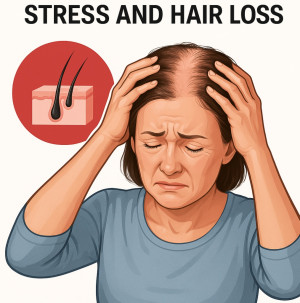About Us
Stress and Hair Loss: Understanding the Connection
Hair loss is one of the most distressing physical signs of prolonged stress. While losing a few hairs daily is normal, periods of emotional or physical strain can push the body into a state that disrupts normal hair growth. For many patients I see at My Hair UK, the trigger is not purely genetic but tied to the demands of modern life, demanding jobs, financial worries, family pressures, or recovery from illness. When stress persists, the scalp often reflects it before the mind catches up.
There are three main ways stress affects hair loss. The most common is telogen effluvium, where large numbers of hairs prematurely shift into the resting phase and then shed several months later. This can cause visible thinning across the scalp. The second, known as trichotillomania, involves compulsive hair pulling, often an unconscious coping response to anxiety. The third, alopecia areata, is an autoimmune condition where the body attacks its own hair follicles. While genetics and immune factors play a role, stressful life events are recognised as potential triggers.
Studies have repeatedly demonstrated the link between psychological stress and hair follicle dysfunction. Research published in 2025 found that stress hormones can inhibit stem cell activity in hair follicles, delaying regeneration and regrowth. Another study identified that patients reporting chronic stress had higher rates of diffuse hair loss compared with those without stress exposure. The biological mechanism involves increased cortisol levels, which disturb the normal hair cycle and impair follicle health.
Patients often describe noticing clumps of hair in the shower, a widening parting, or excessive shedding when brushing. These physical signs can be alarming, and understandably they create more anxiety, feeding a cycle of stress and loss. Yet, most stress related hair loss is reversible once the underlying cause is managed. Early assessment helps determine whether the pattern reflects temporary shedding or a more persistent condition such as androgenetic alopecia.
Treatment depends on identifying and addressing the cause. For telogen effluvium, the focus is on restoring balance: improving sleep, nutrition, and reducing psychological strain. Hair regrowth may begin within several months once stress levels decline. In alopecia areata, treatment may involve corticosteroid injections or topical immunotherapy under specialist care. Trichotillomania often benefits from behavioural therapy to manage compulsive habits. Patients with long term hair thinning can consider medical hair restoration if regrowth remains limited after addressing stress triggers.
At My Hair UK, we see many patients whose stress related hair loss has stabilised but left visible thinning. In such cases, a hair transplant using the Follicular Unit Extraction (FUE) method can restore density and natural appearance. The cost of treatment depends on the number of grafts required. To give context, 1,000 grafts typically cost around £2,899, 2,000 grafts about £3,699, and 3,000 grafts roughly £4,499. These procedures are performed under local anaesthetic and are designed to restore permanent, natural growth where follicles have stopped regenerating.
Before attending a consultation, it is always advisable to visit your local GP for a health check. Many forms of hair loss have underlying medical causes such as thyroid disorders, anaemia, or hormonal imbalance, which should be excluded before considering surgical treatment. Your GP can arrange blood tests, review medications, and ensure your overall health is stable. A clear health assessment provides a solid foundation for any subsequent consultation.
From a psychological perspective, it is worth noting that regaining a sense of control over your appearance can improve emotional wellbeing. Patients often report feeling more confident after treatment, not just because of visible improvement, but because they feel proactive in addressing a problem that previously felt overwhelming. Managing stress is an essential part of that process. Regular exercise, mindfulness, counselling, and social support all play measurable roles in regulating cortisol and promoting recovery.
Hair loss linked to stress does not always need medical or surgical intervention, but when it becomes chronic or uneven, assessment by a qualified doctor is important. The earlier the diagnosis, the better the long term outlook. For many, a combination of lifestyle modification and, when appropriate, hair restoration provides the best results.
Related Articles:
hispanicjobs.com/companies/cost-effectiveness-of-hair-transplants-in-different-regions-4104663
hispanicjobs.com/companies/my-hair-clinics-4289229
hispanicjobs.com/companies/beard-transplant-uk-5078791
hispanicjobs.com/companies/my-hair-uk-manchester-clinic-4987342
hispanicjobs.com/companies/my-hair-uk-birmingham-clinic-4788887
